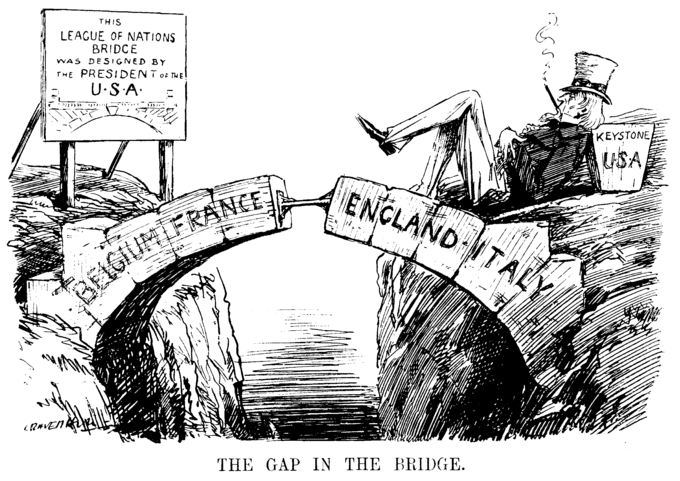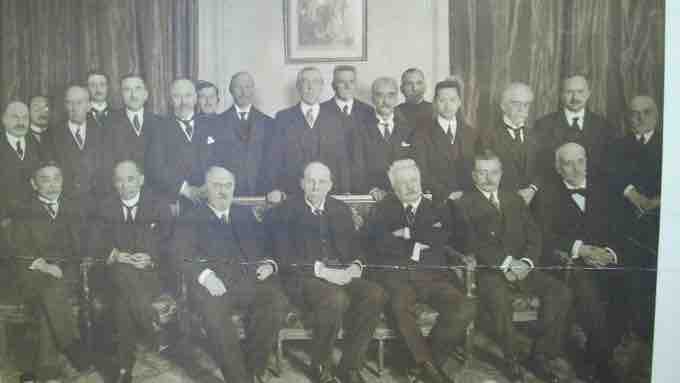The League of Nations was an international, governmental organization founded through negotiations at the Paris Peace Conference of 1919, which officially brought an end to the First World War. The league was the brainchild of U.S. President Woodrow Wilson, who first unveiled the idea in his famed speech to Congress on January 18, 1918 outlining the Fourteen Points, his blueprint for global postwar peace and diplomacy.
The league was the first permanent international organization whose principal mission was to maintain world peace. Its primary goals included preventing wars through collective security and disarmament, and settling international disputes through negotiation and arbitration. It also indirectly addressed labor conditions, just treatment of native inhabitants, human and drug trafficking, arms trade, global health, prisoners of war, and protection of minorities in Europe. At its largest, from September 1934 to February 1935, the league counted 58 nations as members.
While its philosophy and diplomatic aims were groundbreaking, the league never reached its full potential largely due to a lack of participation by key international players, notably Russian and the United States.
League Philosophy
The diplomatic philosophy behind the League of Nations represented a fundamental shift from the preceding hundred years. The league lacked its own armed forces and depended on the traditional Great Powers nations – France, Britain, Russia, Germany, and Japan – to enforce its resolutions, maintain its economic sanctions, or provide military support when needed. Yet the Great Powers were often reluctant to do so because of concerns over weakening their individual strength and using resources outside their borders.
After a number of notable successes and some early failures in the 1920s, the league ultimately proved incapable of preventing aggression by the Axis powers in the 1930s. Germany withdrew from the league, as did Japan, Italy, Spain, and others. The onset of the Second World War proved that the league had failed its primary purpose, which was to prevent another world conflict.
Creating the League
By the time the fighting ended in November 1918, World War I had leveled a profound blow, affecting the social, political, and economic systems of Europe and its colonies and inflicting psychological and physical damage. Anti-war sentiment rose across the world following the First World War, which was described as "the war to end all wars." Its causes vigorously investigated, the war was ultimately blamed on international arms races, alliances, secret diplomacy, and the freedom of sovereign states to enter into war for their own benefit.
One proposed remedy to this sort of damaging international affairs was the creation of an organization whose aim was to prevent future wars through disarmament, open diplomacy, international co-operation, restrictions on the right to wage war, and penalties that made war unattractive. Wilson and his adviser, Colonel Edward M. House, enthusiastically promoted the idea of the league as a means of avoiding any repetition of the bloodshed of World War I, and the creation of the league became the centerpiece of Wilson's Fourteen Points for Peace.
The Paris Peace Conference approved the proposal to create the League of Nations in January 1919, and the league was established by Part I of the Treaty of Versailles. In June 1919, 44 states signed the league's covenant.

Failure of the League
While one of the primary goals of the League of Nations was global diplomacy, the league proved largely unsuccessful in part because it lacked the support of the United States.
The league held its first council meeting in Paris in January 1920, six days after the Versailles Treaty came into force. The aftermath of World War I left many issues to be settled, including the exact position of national boundaries and which country particular regions would join. Most of these questions were handled by the victorious Allied powers, and subsequently the league played little part in resolving the turmoil resulting from the war.

League of Nations Commission
Members of the Commission of the League of Nations in Paris, France, 1919.
League Weaknesses
The league’s major weaknesses can be summed up in three categories: Representation, collective security and enforcement.
Representation at the league was often a problem. Though it was intended to encompass all nations, many never joined, or their time as part of the league was short. The most conspicuous absence was the United States. When the league was born in January 1920, neither Germany nor Russia was permitted to join. The league was further weakened when major powers, such as Japan and Italy, left in the 1930s.
The second important weakness grew from the contradiction between the idea of collective security that formed the basis of the league and international relations between individual states. The league's collective security system required nations to act, if necessary, against states they considered friendly, and in a way that might endanger their national interests, to support states for which they had no normal affinity.
Finally, the League of Nations lacked any type of armed forces of its own and depended on the Great Powers to enforce its resolutions, which they were unwilling to do. Its two most important members, Britain and France, were reluctant to use sanctions and even more reluctant to resort to military action on behalf of the league as pacifism had become a strong force among the people and the leaders of the two countries in the aftermath of World War I.
United States Rejects the League
Despite Wilson's efforts to establish and promote the organization, for which he was awarded the 1919 Nobel Peace Prize (bestowed in 1920) in recognition of his work as the “Father of the League of Nations”, the United States did not join the league due to opposition from Republicans in the Senate.
The Republican Party, led by Henry Cabot Lodge, controlled the U.S. Senate after the election of 1918, but its members were divided into multiple positions on the Treaty of Versailles and, subsequently, the League of Nations. Even a majority coalition, but they could not attain the two-thirds majority needed to pass the treaty. Among the American public, Irish-Catholics and German-Americans were intensely opposed to the treaty, claiming it favored the British.
An angry bloc in the Senate of 12 to 18 "Irreconcilables" – mostly Republicans, but also representatives of the Irish and German Democrats – fiercely opposed the treaty. One bloc of Democrats strongly supported the Versailles Treaty, even with reservations added by Lodge. A second group of Democrats supported the treaty but followed Wilson in opposing any amendments or reservations.
The largest bloc, led by Lodge, wanted a treaty with reservations, especially on Article X, which involved the power of the League of Nations to make war without a vote by the U.S. Congress. The Irreconcilables were bitter enemies of President Wilson, and he launched a nationwide speaking tour in the summer of 1919 to refute them. However, Wilson collapsed midway through the tour with a serious stroke that effectively ruined his leadership abilities.
Henry Cabot Lodge
Senator Henry Cabot Lodge led the Irreconcilables, a group of legislators who blocked approval of the Treaty of Versailles in the U.S. Congress.
Wilson's successor, President Warren G. Harding, continued American opposition to the League of Nations. It was not until July 21, 1921, that Harding signed into law the Knox-Porter Resolution drafted by Congress, which formally ended hostilities between the U.S. and the Central Powers.
The United States was the only major power to emerge from World War I in a position of relative economic strength, with all other participants in debt, putting America in the best position to intervene in international disagreements with potential for war. Therefore, the U.S. refusal to ratify the Treaty of Versailles and join the league had global consequences in terms of the financing and enforcement America could have brought to bear on league diplomacy.
The irony of the large, wealthy nation whose president first proposed the league failing to join its ranks was not lost on other countries and was a major reason why the league did not become the great diplomatic clearing house envisioned by Wilson. The league cannot be labeled a failure, however, as it laid the groundwork for the United Nations, which replaced the League of Nations after World War II and inherited a number of agencies and organizations founded by the league.